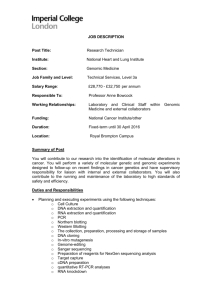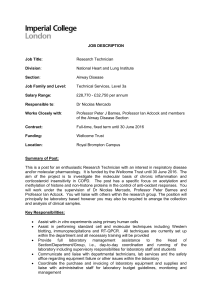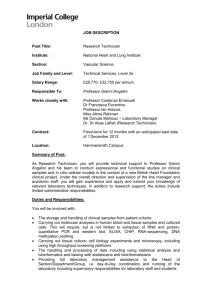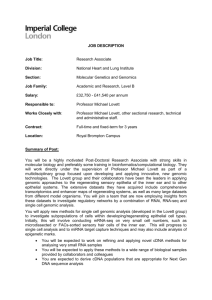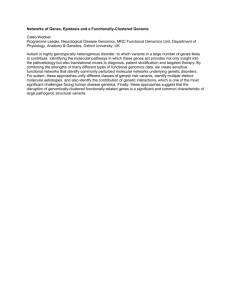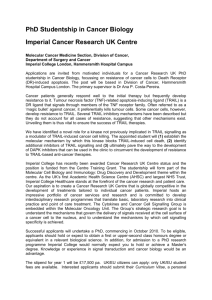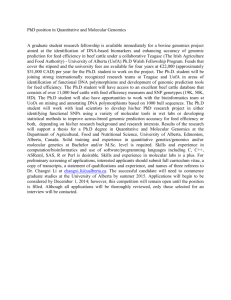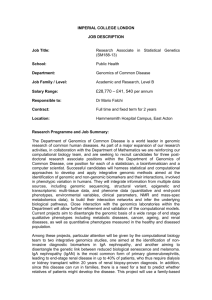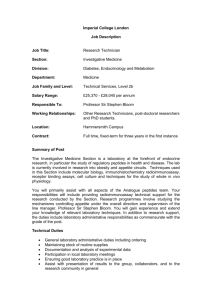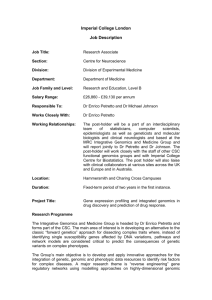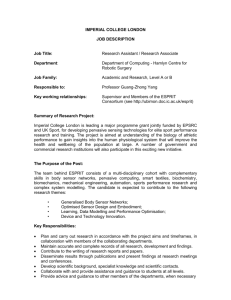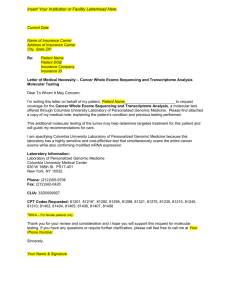Other Duties - Workspace - Imperial College London
advertisement
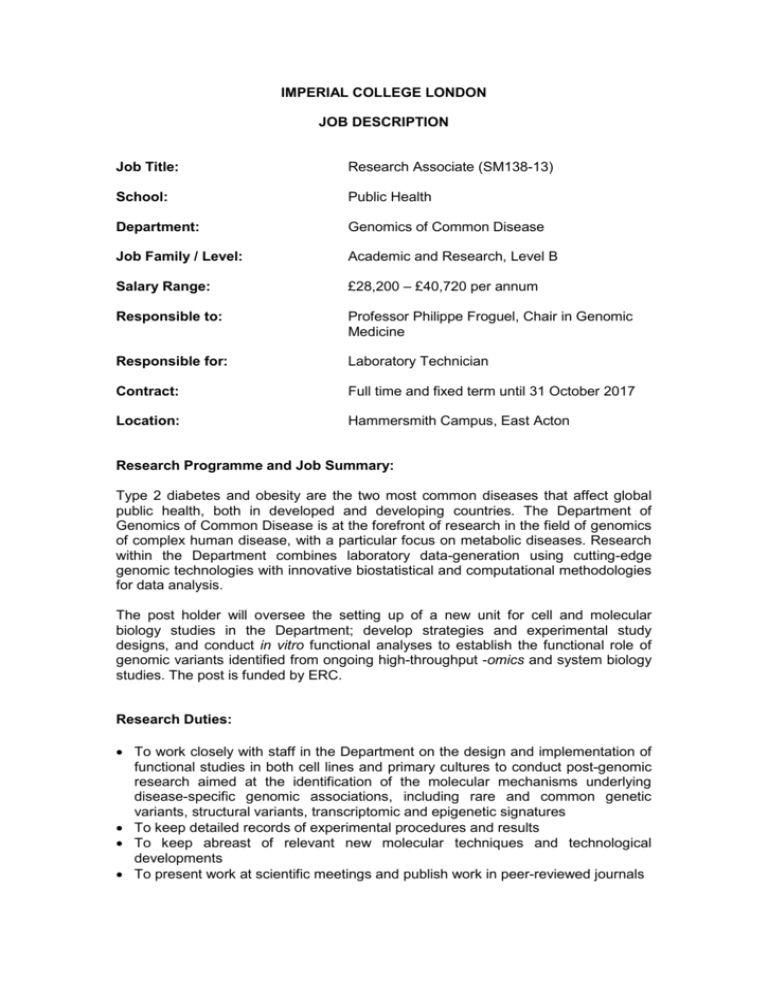
IMPERIAL COLLEGE LONDON JOB DESCRIPTION Job Title: Research Associate (SM138-13) School: Public Health Department: Genomics of Common Disease Job Family / Level: Academic and Research, Level B Salary Range: £28,200 – £40,720 per annum Responsible to: Professor Philippe Froguel, Chair in Genomic Medicine Responsible for: Laboratory Technician Contract: Full time and fixed term until 31 October 2017 Location: Hammersmith Campus, East Acton Research Programme and Job Summary: Type 2 diabetes and obesity are the two most common diseases that affect global public health, both in developed and developing countries. The Department of Genomics of Common Disease is at the forefront of research in the field of genomics of complex human disease, with a particular focus on metabolic diseases. Research within the Department combines laboratory data-generation using cutting-edge genomic technologies with innovative biostatistical and computational methodologies for data analysis. The post holder will oversee the setting up of a new unit for cell and molecular biology studies in the Department; develop strategies and experimental study designs, and conduct in vitro functional analyses to establish the functional role of genomic variants identified from ongoing high-throughput -omics and system biology studies. The post is funded by ERC. Research Duties: To work closely with staff in the Department on the design and implementation of functional studies in both cell lines and primary cultures to conduct post-genomic research aimed at the identification of the molecular mechanisms underlying disease-specific genomic associations, including rare and common genetic variants, structural variants, transcriptomic and epigenetic signatures To keep detailed records of experimental procedures and results To keep abreast of relevant new molecular techniques and technological developments To present work at scientific meetings and publish work in peer-reviewed journals To line manage a Laboratory Technician and assist with the supervision of other laboratory staff (postdocs and PhD/MSc students) To participate in fortnightly department research-in-progress meetings, journal club and seminars Other Duties To comply with the College, School, and Departmental safety practices and to attend courses on safety as appropriate To observe and comply with all College policies and regulations, including the key policies and procedures on Confidentiality, Conflict of Interest, Data Protection, Equal Opportunities, Financial Regulations, Health and Safety, Imperial Expectations (for new leaders, managers and supervisors), Information Technology, Private Engagements and Register of Interests, and Smoking To undertake specific safety responsibilities relevant to individual roles, as set out on the College Website Health and Safety Structure and Responsibilities page http://www3.imperial.ac.uk/safety/policies/organisationandarrangements Any other duties commensurate with the grade of the post as directed by the head of department Job descriptions cannot be exhaustive and so the post holder may be required to undertake other duties, which are broadly in line with the above key responsibilities. Imperial College is committed to equality of opportunity and to eliminating discrimination. All employees are expected to adhere to the principles set out in our Equal Opportunities in Employment Policy, Promoting Race Equality Policy and Disability Policy and all other relevant guidance/practice frameworks. PERSON SPECIFICATION Qualifications Essential PhD in Cell Biology, Genetics, Molecular Genetics or closely related discipline, or equivalent research, industrial or commercial experience Knowledge / Experience Essential Extensive postdoctoral research experience Practical experience of cell culture research methods Documented evidence of ability to prepare manuscripts for publication in peerreviewed journals Knowledge and experience of a wide range of basic research methods such as extraction and quantification of DNA, RNA and protein from blood and other tissues Expertise in several of the following: cell/tissue culture, molecular cloning, gene expression analysis including (real-time) RT-PCR, fluorescence microscopy, analysis of cell signalling, electrophoretic mobility shift assays, luciferase reporter assays, western blot analysis, ChIP, RNAi. Basic knowledge of statistics and bioinformatics Experience of working well as part of a team Demonstration of experience and taking responsibility for the smooth running of a busy and hard working laboratory Desirable Practical experience of array-based technologies such as genotyping, gene expression and methylation arrays Skills and Abilities Essential Ability to prioritise a varied workload and work under pressure to meet deadlines while maintaining a high level of accuracy Demonstrable ability to innovate, and ability to trouble-shoot technical problems Ability to communicate clearly with scientists from multi-disciplinary backgrounds Ability to organise own workload with minimal supervision Thoroughness and ability to keep accurate and thorough laboratory records Excellent organizational skills Ability to work well independently and as part of a team, being prepared to work at a high level of productivity Good computer skills Ability to deal with colleagues in a professional manner at all times Ability to change and adapt according to the development of the project Excellent written and verbal communication skills Ability to assist in directing junior researchers and assist in motivating others to produce a high standard of work Ability to exercise initiative and work independently Personal Attributes Essential Self-motivated Creative approach to problem solving Other Essential Willingness to travel both within the United Kingdom and abroad to conduct research and attend conferences Imperial Expectations These are the 7 principles that Imperial leaders, managers and supervisors are expected to follow: 1) Champion a positive approach to change and opportunity 2) Communicate regularly and effectively within, and across, teams 3) Consider the thoughts and expectations of others 4) Deliver positive outcomes 5) Encourage inclusive participation and eliminate discrimination 6) Support and develop staff to optimise talent 7) Work in a planned and managed way APPLICATION GUIDANCE Please read the person specification carefully and describe, as part of your application, how much you feel you meet each of the criteria. To facilitate completing your application, please prepare the following information: A cover letter describing your research interests and why you wish to apply for the position Current curriculum vitae Date that you anticipate starting a postdoctoral position Your CV it should include the following information: Applicant’s full name, private address and private telephone number A confidential e-mail address and fax number, where possible Degrees (including University and dates) Past and present posts List of publications Brief description of future research plans Names, addresses and email for three referees. Thank you for your interest in this post. We look forward to receiving your application.
